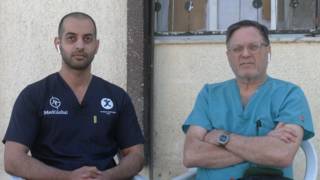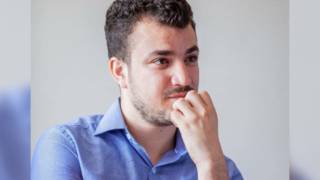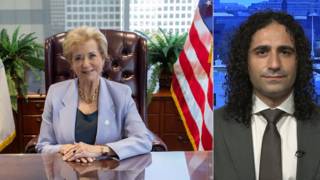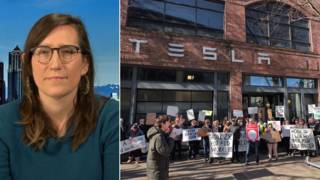HeadlinesJuly 08, 2010
Appeals Court to Weigh Attempt to Restore Drilling Ban
A federal appeals court will hear arguments today in the Obama administration’s attempt to reinstate its six-month ban on deepwater oil drilling in the Gulf of Mexico. The ban was imposed in May as the BP oil spill spiraled into what many have called the worst environmental disaster in US history. But a US district judge with financial ties to energy companies struck down the order, ruling it unfairly assumed other drilling sites posed similar dangers.
BP Claims New Target Date for Sealing Well
BP, meanwhile, says it’s now aiming to seal off the well by the end of the month, weeks before the company’s public deadline. The new July 27th target coincides with BP’s date to report second-quarter earnings and speak to investors. In an interview with the Wall Street Journal, a top BP official said the new target is “unlikely” and that efforts could be further complicated by the hurricane season. Oil from the well continues to reach new areas of the Gulf. In St. Tammany Parish near New Orleans, workers are cleaning up tar balls that washed into Lake Pontchartrain this week. St. Tammany Parish President Kevin Davis said locals had previously been hopeful the oil wouldn’t reach their area.
Kevin Davis: “From an emotional standpoint, it’s really tough. It’s tough on all of our residents throughout this whole region. This kind of in our mind was the last frontier, that we were hoping and praying we wouldn’t get any oil.”
Report: 27,000 Abandoned Wells Pose Threat to Gulf Coast
In other news from the Gulf, concerns are being raised about the hazards posed by thousands of abandoned oil and gas wells throughout the region. The Associated Press reports more than 27,000 abandoned sites are in danger of leaking, with about 13 percent said to be particularly worrisome. Regulations forcing companies to plug the wells have been routinely ignored with no government intervention. Overall, BP has abandoned about 600 wells. The well beneath the Deepwater Horizon was being sealed for temporary abandonment when the rig explosion causing the disaster occurred.
60 Killed in Iraq Bombings Targeting Shiite Pilgrims
At least sixty people have been killed and over 300 wounded in attacks on Shiite pilgrims across the Iraqi capital of Baghdad. In the worst violence, thirty-two people were killed in a suicide bombing on Wednesday. Seven people were killed and over seventy-five wounded in a pair of attacks earlier today.
US, Russia Negotiate Swap of Alleged Spies
The US and Russia are negotiating a swap in which ten alleged Russian spies would be released in exchange for an alleged US spy held for the past decade in Russia. The Russian suspects were detained in recent days following a reportedly decade-long investigation. Prosecutors have claimed they were directed not to infiltrate US agencies or steal secrets, but to gather information on individuals and issues that could affect US-Russia relations. The rumored exchange is said to hinge on the Russian suspects reaching a plea deal in a New York federal court. On Thursday, one of the suspects, Vicky Peláez, a columnist for the New York-based Spanish-language newspaper El Diario, was ordered to remain in prison after having initially been granted release on bail. Defense attorney John Rodriguez criticized the ruling.
John Rodriguez: “I can tell you, she is in — she’s in poor spirits right now. She’s not well. She’s tired. She had hoped to get out. Remember, she’s in secured facilities, and there’s very little contact with anyone, and she’s not feeling well right now. She’s very saddened by the turn of events.”
Cuba to Free Over 50 Jailed Dissidents
Cuba has announced plans to release over fifty jailed dissidents under an agreement with Spain and the Cuban Catholic Church. Five of the prisoners would be freed immediately, followed by the remainder over the coming months. The move would reduce the number of jailed Cuban dissidents to around 100. Cuba has long claimed many dissidents have acted in the service of US efforts to destabilize its government.
Indian Forces Impose Curfew in Kashmir in Wake of Protest Deaths
Indian forces have escalated a crackdown in Kashmir following weeks of protests against the Indian occupation. At least fifteen Kashmiris have been killed in ongoing protests over the past month. India has imposed a twenty-four-hour curfew in parts of Kashmir for the first time in two decades. The demonstrations were sparked by the death of a seventeen-year-old student after he was hit by a tear gas canister during a protest last month. The Los Angeles Times correspondent in Kashmir, Mark Magnier, says Indian forces assaulted him and broke his camera as he tried to cover enforcement of the curfew.
Spanish Court Orders New Probe of US Killing of Spanish Journalist
The Spanish Supreme Court has ordered a new probe into the 2003 killing of José Couso in Iraq. A Spanish journalist, Couso died when US troops shelled Baghdad’s Palestine Hotel in April 2003. In a 2008 interview with Democracy Now!, former Army Sergeant Adrienne Kinne revealed she saw the Palestine Hotel on a military target list and said she frequently intercepted calls from journalists staying there. A Spanish court dropped charges against the accused US soldiers last year, but Couso’s family appealed.
Ex-Guatemalan Soldier Pleads Guilty to Concealing Role in 1982 Dos Erres Massacre
A former Guatemalan soldier has pleaded guilty to concealing his role in a 1982 massacre when he applied for US citizenship. On Wednesday, Gilberto Jordan admitted in a Florida courtroom to lying about his involvement in the killings of more than 250 villagers in the mountain hamlet of Dos Erres by US-backed forces. As part of his plea, Jordan acknowledged killing a number of villagers, including a baby he threw down a well. He faces a maximum sentence of ten years in prison. Advocates for Dos Erres massacre victims say they’ll push ahead for Jordan’s extradition to Guatemala to stand trial.
British Probe Clears “Climategate” Scientists
A British university probe has cleared a team of scientists linked to the so-called “Climategate” controversy last year. The University of East Anglia launched the investigation after over 1,000 emails were stolen from its Climatic Research Unit and publicly released. Deniers of global warming had claimed the stolen emails provided evidence of an effort to silence academics who have questioned or downplayed human-driven climate change. But in the latest of several probes to clear the scientists involved, panelists found no proof of the charges. University of East Anglia Vice Chancellor Edward Acton said he hopes the so-called controversy can be put to rest.
Edward Acton: “Today, for the third and hopefully for the final time, an exhaustive independent review has exposed as unfounded the whole thrust of the allegations against our science. We hope the commentators will accurately reflect what this highly detailed independent report says and finally lay to rest the conspiracy theories, untruths and misunderstandings that have circulated.”
The British probe comes one week after a Penn State panel exonerated one if its top scientists whose emails were among those released.
Obama Vows to Push Trade Pacts
President Obama is renewing a vow to push ahead with several bilateral trade deals, including a stalled pact with Colombia. Obama addressed the trade agreements in a speech from the White House.
President Obama: “We also want to deepen and broaden our relations with Panama and Colombia. So we’re working to resolve outstanding issues with the free trade agreements with those key partners, and we’re focused on submitting them as soon as possible for congressional consideration.”
The Colombia pact has been held up amidst concerns over human rights violations, including the killings of union leaders. President Obama voiced opposition to the deal during his run for office but has since reversed his stance.
Report: Raytheon Hired for NSA Surveillance of Infrastructure Hacking
And the Wall Street Journal has revealed the National Security Agency has launched a new domestic surveillance program to detect cyber assaults on critical US infrastructure. The program, dubbed “Perfect Citizen,” would rely on sensors to track unusual activity in the computer networks behind infrastructure such as the electricity grid and nuclear power plants. The military contractor Raytheon has been awarded a contract worth up to $100 million for the program’s initial stage. The expansive program has raised concerns about the NSA potentially intruding on domestic affairs as well as privacy rights. An internal Raytheon email even says of the program: “Perfect Citizen is Big Brother.”
Most popular
- 1
- 2
- 3
- 4
Non-commercial news needs your support
Please do your part today.











Media Options